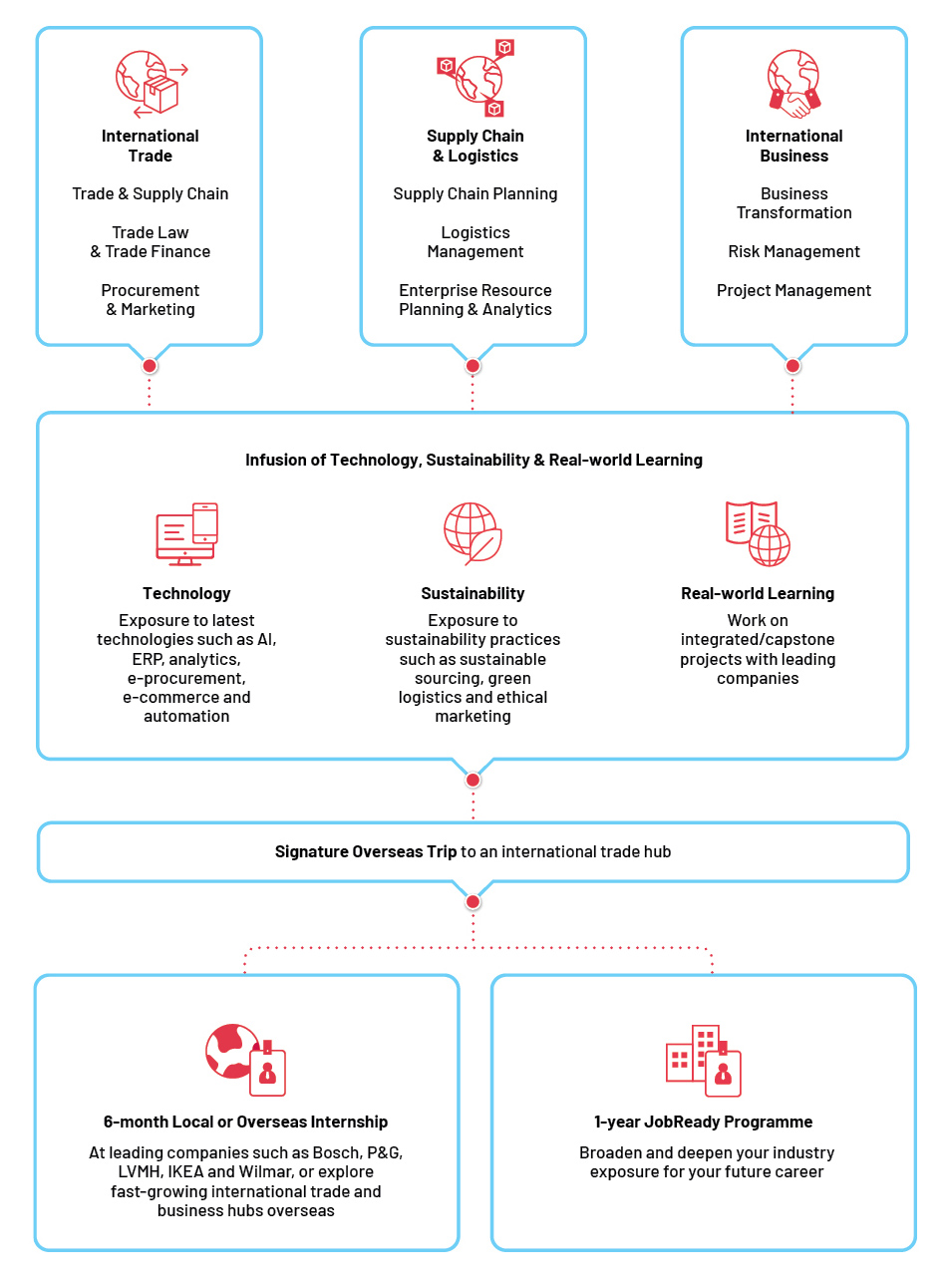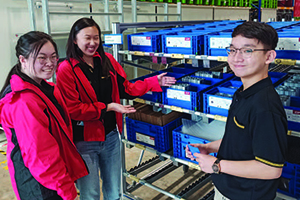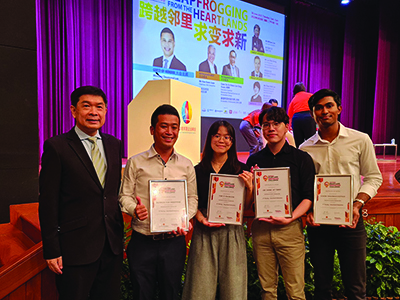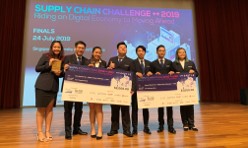Why ITB?
- Gain real-world experience through integrated industry projects with leading companies, equipping you for in-demand roles in trade and supply-chain management
- Future-proof yourself by leveraging the latest technologies and sustainability practices to address global challenges
- Embark on an immersive Signature Overseas Trip to an international trade hub to experience first-hand different business practices and cultures globally! NEW
- Design your learning by choosing between a six-month local or overseas internship, or the one-year JobReady Programme with renowned international companies
About ITB
Ever wondered how leading multinational companies such as Bosch, P&G, LVMH, and IKEA plan, procure, produce, distribute and market their products globally? As companies increasingly look to Asia and Southeast Asia for its long-term growth prospects, many are managing their regional or global supply chains from Singapore. This has resulted in the rising need for international trade and supply chain professionals.
With the Diploma in International Trade & Business (ITB), you can set your sights on an exciting career in planning, procurement, trade operations, logistics management and marketing in international companies!
Equipped with knowledge of trade markets, supply chain management, trade law, and trade finance, you’ll also develop skills in Enterprise Resource Planning (ERP), analytics, business transformation, and risk management, enabling you to make data-driven decisions and excel in the field.
As companies adopt the latest technologies to gain an edge, ITB will equip you with essential skills in artificial intelligence (AI), ERP, analytics, e-procurement, e-commerce, and automation. You will also learn to create sustainable supply chain strategies that align with business goals by gaining expertise in sustainable sourcing, green logistics, and ethical marketing.
Our strong links with industry means you get to work on integrated and capstone projects with leading companies to solve real-world challenges. This will also allow you to gain hands-on experience in managing business transformation initiatives.
You’ll also get to embark on an all-new immersive Signature Overseas Trip to an international trade hub, where you will experience first-hand the different business practices and cultures!
In your final year, choose either a six-month local/overseas internship, or the one-year JobReady Programme designed to broaden and deepen your industry exposure. Our partners include leading multinationals such as Bosch, P&G, LVMH and IKEA, global trading companies such as Wilmar, global logistics companies such as CEVA Logistics, and local firms such as SATS.
Both pathways offer exposure to a wide range of high-growth sectors, preparing you for in-demand roles such as International Marketing Executive, International Procurement Executive, Supply Chain Planning Executive, Supply Chain Risk & Resilience Analyst, Trade Operations Executive and Logistics Executive.
Highlights of Skills & Competencies

Highlights
Real-world Application
Award-Winning Business Idea
Further Studies
As an ITB graduate, you can pursue degrees in international trade and supply chain management, as well as other business degree courses at all local and overseas universities.
Careers
With Singapore’s growing role as a global trade and supply chain hub, your job prospects are bright! You can pursue a wide variety of in-demand and supply chain-related careers across diverse sectors.
You can look forward to opportunities in these roles:
- Business Development Executive
- International Business Analyst
- International Business Entrepreneur
- International Marketing Executive
- International Procurement Executive
- Logistics Executive
- Supply Chain Planning Executive
- Supply Chain Risk & Resilience Analyst
- Trade Compliance Officer
- Trade Operations Executive
Entry Requirements
AGGREGATE TYPE ELR2B2-B
To be eligible for consideration, candidates must have the following GCE ‘O’ Level examination (or equivalent) results.
| Subject | 'O' Level Grade |
|---|---|
| English Language | 1-6 |
| Additional Mathematics/Mathematics | 1-6 |
| Any one of the 2nd group of Relevant Subjects for the ELR2B2-B Aggregate Type | 1-6 |
Applicants must also fulfil the aggregate computation requirements for the ELR2B2-B Aggregate Type ( English Language, 2 relevant subjects and 2 other best subjects) listed at www.np.edu.sg/docs/ELR2B2.pdf .
For students with other qualifications, please refer to the NP website for the entry requirements and admissions exercise period.
What You Will Learn
Economics (3 Credit Units)
This module provides students with an understanding of the core principles of microeconomics and macroeconomics with an application of these concepts in real-world business scenarios. Topics include Demand and Supply, Price Elasticity, Market Structure, Gross Domestic Product, Unemployment, Inflation, Fiscal and Monetary policy.
Global Business (3 Credit Units)
This module provides students with fundamental knowledge of how the external business environment, consisting of country and industry level factors, affects the overall strategy, organisational structure and various internal functions of international businesses. Students will also discuss how contemporary world affairs, such as the impact of globalisation, terrorism, pandemics, emergence of economic powers in Asia and digitalisation present both opportunities and challenges to international businesses.
Makings of a Business (4 Credit Units)
Students will gain hands-on and real-world experience as they actively learn to integrate and apply knowledge and skills acquired in various modules to manage different types of businesses through game simulation. They will gain understanding of the inter-dependence of the different business functions, and to make data-driven decisions to address day-to-day operations of a business. They will also develop critical thinking and complex problem-solving skills as they analyse performance data and evaluate decisions to improve overall company performance.
Programming for Business (3 Credit Units)
This module provides students with fundamental programming concepts and best coding practices through the extensive use of in-class demonstrations and hands-on practices. Students will learn how technology functions by building digital solutions such as business applications and tasks automation by applying their programming skills. Students will learn how to problem solve through computational thinking.
Statistical Applications for Business (4 Credit Units)
This module introduces students to basic statistical concepts, tools and models. Students will learn how to organise and analyse data, as well as interpret results for decision-making in the business world. Students will apply and reinforce their learnings through data presentation and performing descriptive analysis on data generated from the Business Simulated Game.
Health & Wellness (1 Credit Unit)
This is a Level 1 Core module for all Year 1 students. The module will introduce students to the importance of maintaining both physical and mental health through the knowledge and monitoring of health indicators, and application through appropriate exercises. The aim of the module is to empower students with basic knowledge and skills to be independent and responsible in maintaining overall personal health.
Innovation Made Possible^ (3 Credit Units)
English Language Express* (Credit Units - NA)
English Language Express aims to give you a better grounding in the English Language and to strengthen the written and oral communications skills that you will need in your academic and professional careers. You will be engaged in writing, reading, listening and speaking activities that will develop your ability to speak and write grammatically, coherently and clearly. You will also hone your reading and listening comprehension skills.
* This module is only offered to students who are weaker in the English Language.
^ Critical Core modules account for 10 credit units of the diploma curriculum. They include modules in innovation and world issues, as well as an interdisciplinary project. By bringing students from diverse diplomas together, the interdisciplinary project fosters collaboration to explore and propose solutions for real-world problems. NP aims to develop students to be agile and self-directed learners, ready for the future workplace.
This module teaches students to effectively refine their written and spoken communication skills, discussion techniques, and people skills. Students will learn techniques to think on their feet to deliver an effective business pitch confidently. They will learn to persuasively communicate opportunities and ideas by creatively tailoring their business message for their target audience using storytelling techniques. Students will also develop their information literacy skills to craft clear business messages using APA style referencing.
Business Law (3 Credit Units)
This module provides students with an understanding of the basic knowledge of the law and its application in a business environment. Topics include the Singapore Legal System, Law of Contract, Law of Tort, Law of Agency/E-Commerce/Artificial Intelligence Law (E-Comm/AI Law), Law of Business Organisations, Introduction to Company Law and Intellectual Property Law. Students will also develop clarity of thought that requires a critical discerning eye and logical reasoning when applying legal principles to practical business decisions.
Kickstart a Business (4 Credit Units)
The module is designed for students to integrate and apply learning from the different modules to address real-world challenges provided by industry partners. Using the Lean methodology, students will build a Lean Canvas Model to develop and showcase a minimum viable product to address challenges and evaluate opportunities. They will learn about resource optimisation and value creation for businesses.
Finance & Accounting for Business (3 Credit Units)
The module imparts basic accounting and finance knowledge to students, in areas such as accounting equations, accounting principles, financial statements, ratio analysis, cash budgeting, short-term financing strategies, time value of money and capital investment analysis. Students will demonstrate their understanding by using financial software to interpret financial accounting information for decision-making in business environments when working on integrated project scenarios.
User-Centred Design for Business (3 Credit Units)
The module covers digital media design competencies with user-centered design principles. Students will learn to use design software and apply the design competencies on digital platforms such as web, mobile and desktop. Students will also learn to address digital design issues related to the user experience, presentation of the information, the imagery and the visualisation during their designing process.
Career & Professional Preparation (2 Credit Units)
This module supports students in their journey of self-discovery, character-building, NP values-inculcation, development of education and career goals via experiential activities and guided reflections with CPP coaches. To prepare them for their career and the future, students will also deepen their knowledge of the respective diploma curriculum and industries through learning journeys, mentorship and opportunities for interactions with alumni and industry practitioners. The module will incorporate a more comprehensive feedback and reflective approach from self, peers, tutors and the industry mentor to support students’ holistic growth and development.
This module equips students with practical knowledge and skills to make data-driven and culturally adapted international marketing decisions. Students will learn to conduct international marketing research, develop omni-channel marketing plans, including digital strategies, and apply persuasive sales techniques across diverse markets. Ethical and sustainable practices are emphasised throughout the module, preparing students to navigate global marketing challenges professionally and responsibly.
International Procurement with Sustainable Practices
This module brings students through the increasingly digitalised procurement lifecycle, from prioritising requisitions, to conducting financial analysis of suppliers, to ensuring supplier compliance. Students will be trained to conduct negotiations and manage the entire procurement process with consideration to professionalism, ethics and sustainability. This module will prepare students with practical knowledge and skills to select, engage and manage suppliers around the world.
International Trade & Supply Chain
This module provides students with a broad understanding of the complex and dynamic world of international trade. Students will learn about international trade theories and industry analysis concepts while gaining insights into major manufactured goods and commodity markets. This module introduces supply chain as the backbone of international trade and how companies leverage on it to gain a competitive edge. Students will learn to develop an agile, resilient and sustainable supply chain through topics on supply chain strategy and performance, distribution network design, and supply chain coordination.
International Trade Law & Finance
This module provides an overview on how international trade transactions are governed and enabled by international law and regulations. Students will gain an appreciation of the legal protection offered by international laws covering sales, electronic transactions, carriage of goods and dispute resolution. With coverage on topics such as trade finance instruments, risk management in trade finance and digitalisation in trade finance, students will acquire a key understanding of the role of trade finance in international trade.
This module explores the core concepts and tools of ERP and business analytics via a hands-on learning approach. The module covers how enterprise resource planning systems streamline and integrate processes within an organization. With an emphasis on data quality and cleansing techniques, students will be introduced to using leading business analytics tools to transform raw data into insightful visualisations that support strategic decision-making.
Logistics Management
This module explores the vital role of global transportation in international trade, from sea, air and land transport to the complexities of urban logistics. Besides concepts of warehouse management, this module also guides students on how to plan and design safe and efficient spaces. Students will be introduced to the application of logistics technologies and eco-friendly practices that are shaping the future of sustainable global trade.
Sustainable Supply Chain Planning
This module equips students with the knowledge and skills to make data-driven and sustainable supply chain decisions. Covering key areas such as forecasting, demand and supply planning, inventory management, and sales and operations planning, the module offers comprehensive exposure to each crucial aspect. These will help students develop a holistic understanding of supply chain planning within a dynamic business environment, and its essential impact on business efficiency and competitiveness.
Trade Operations
This module focuses on several key areas of international trade, such as trade restrictions, customs practices and freight forwarding. Students will explore costings, cargo insurance and security compliance, while also learning the essential finance and transport documentation, including e-documents, needed for smooth import/export operations. The module will provide students with a broad understanding of the many components involved to make international trade possible.
World Issues: A Singapore Perspective^ (2 Credit Units)
^ Critical Core modules account for 10 credit units of the diploma curriculum. They include modules in communication, innovation and world issues, as well as an interdisciplinary project. By bringing students from diverse diplomas together, the interdisciplinary project fosters collaboration to explore and propose solutions for real-world problems. NP aims to develop students to be agile and self-directed learners, ready for the future workplace.
Applied Project in International Business is a capstone project module designed to examine the international trade and supply chain landscape through a sustainable lens. This industry project requires students to integrate various functional areas, such as supply chain planning, procurement, logistics management and marketing, while seeking out business process improvement opportunities and adopting a risk management approach. The module trains students on practical skills, such as project management, stakeholder management and change management, to ensure that they are well-equipped to successfully drive, manage and deliver the outcomes of projects.
Business Transformation
This module will endow students with the skills and knowledge to optimise business processes and enhance organisational performance. Students will learn to utilise various performance measurement frameworks and techniques to analyse and align performance to the organisation’s goals and strategies. Through the application of business process improvement methodologies and tools, students will explore innovative ways for problem-solving, continuous improvement and business transformation in a global trade environment.
Risk Management & Business Resilience
This module provides students with broad insights into the entire risk management process, from risk identification through to business continuity planning. Students will understand how the interconnectedness of various types of risk, such as geopolitical risk, environmental risk and cybersecurity risk, will have an amplifying impact on global trade. Students will gain essential knowledge to effectively manage and mitigate any disruption in order to preserve resilience in the enterprise.
Project ID: Connecting The Dots^ (4 Credit Units)
^ Critical Core modules account for 10 credit units of the diploma curriculum. They include modules in communication, innovation and world issues, as well as an interdisciplinary project. By bringing students from diverse diplomas together, the interdisciplinary project fosters collaboration to explore and propose solutions for real-world problems. NP aims to develop students to be agile and self-directed learners, ready for the future workplace.
This industry attachment provides students with an additional opportunity for on-the-job training. Students are able to build up their network and portfolio while gaining skills and knowledge through first-hand experience in the professional world. They will be coached by a mentor in the company throughout the period of attachment.
Year 3
One-Year JobReady Programme
This industry attachment provides authentic learning experiences in a real-world, and self-driven learning environment for students to apply their competencies to practical work issues. Students will have the opportunity to acquire new skills and knowledge by being placed in real-world work situations. Throughout the period of attachment, they will be coached by a mentor in the company.
Industry Attachment 2 (18 Credit Units)
This industry attachment provides students with an additional opportunity for on-the-job training. Besides gaining skills and knowledge through service-learning as well as first-hand experience in the professional world, students are able to build up their network and portfolio. They will be coached by a mentor in the company throughout the period of attachment.
Project ID: Connecting The Dots^ (4 Credit Units)
^ Critical Core modules account for 10 credit units of the diploma curriculum. They include modules in communication, innovation and world issues, as well as an interdisciplinary project. By bringing students from diverse diplomas together, the interdisciplinary project fosters collaboration to explore and propose solutions for real-world problems. NP aims to develop students to be agile and self-directed learners, ready for the future workplace.












